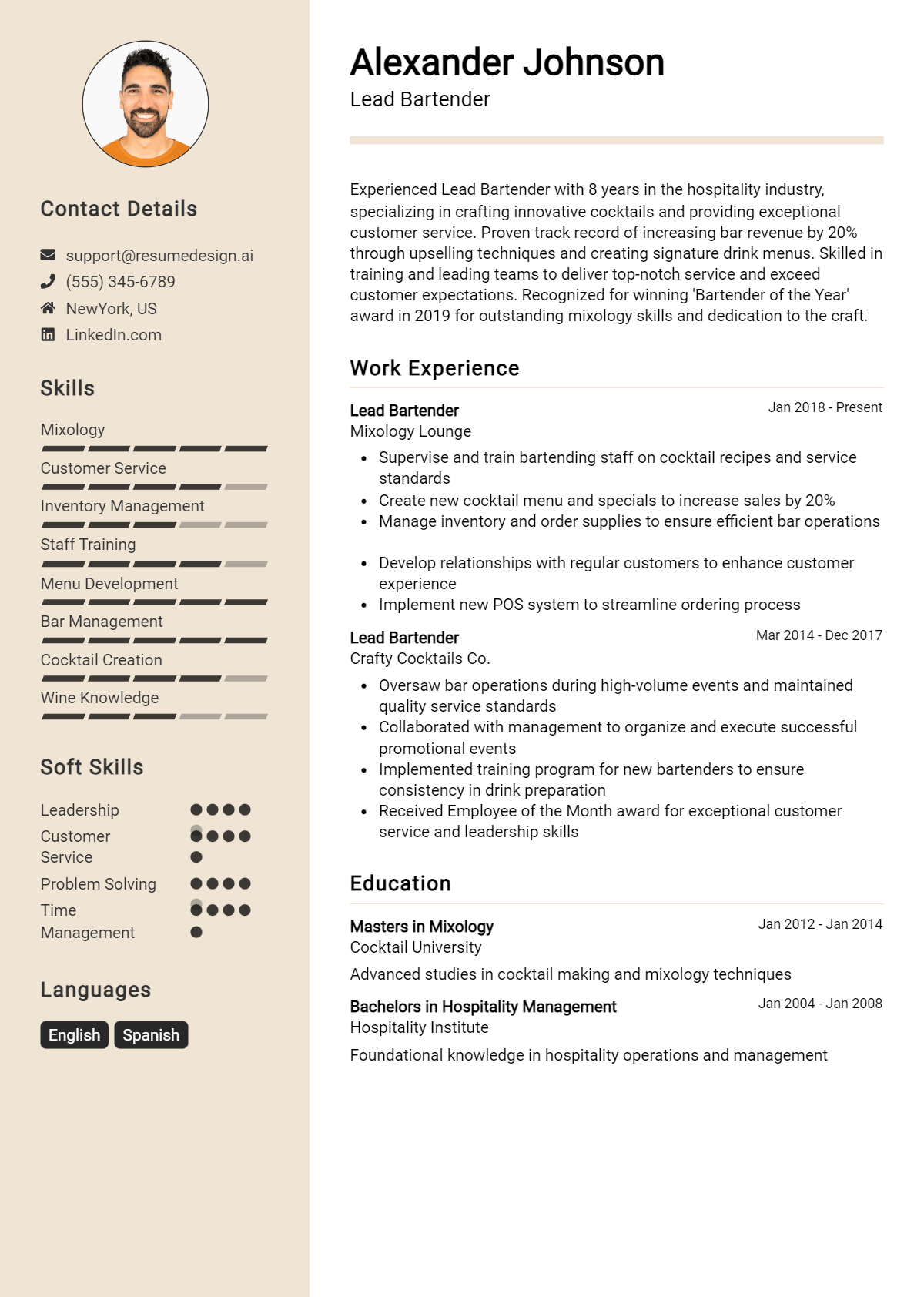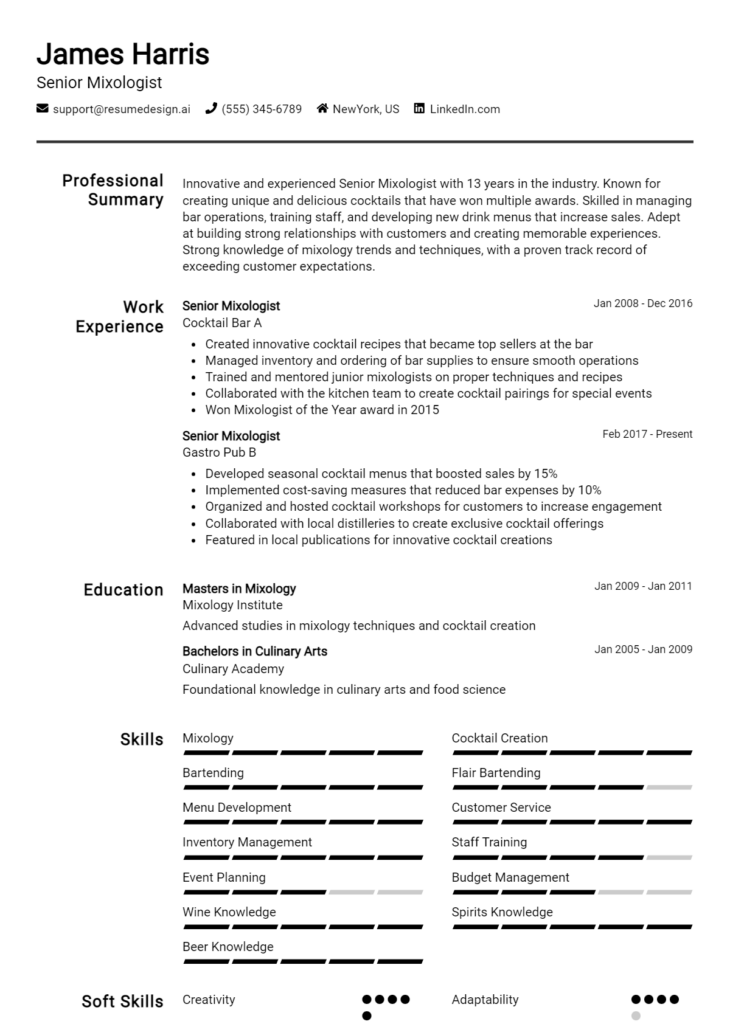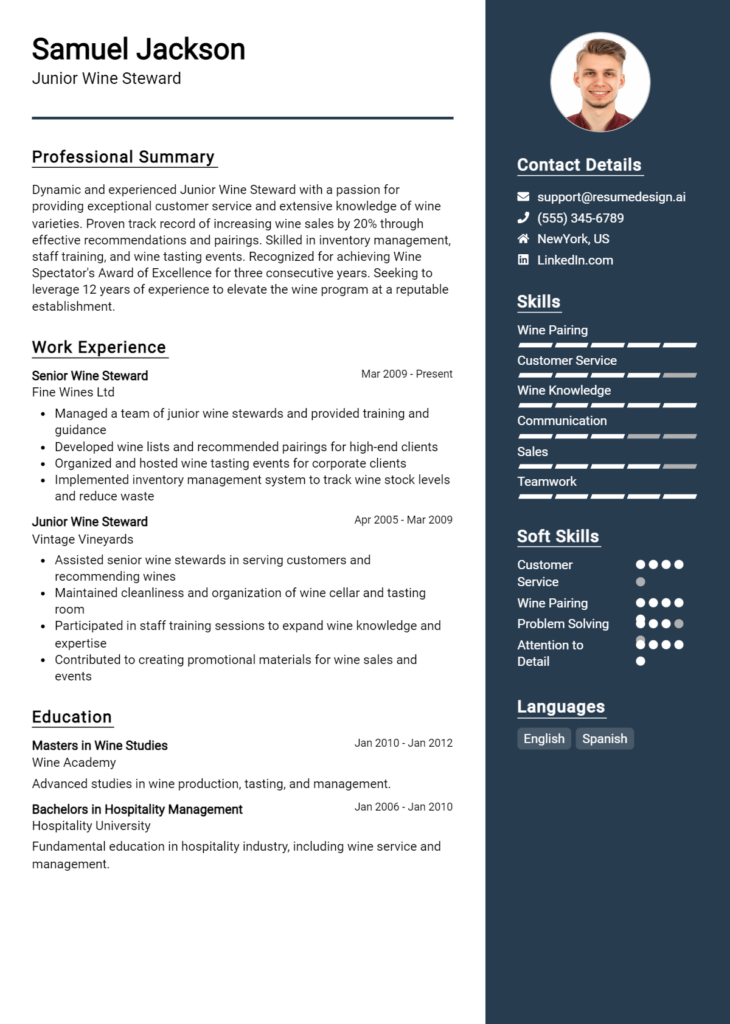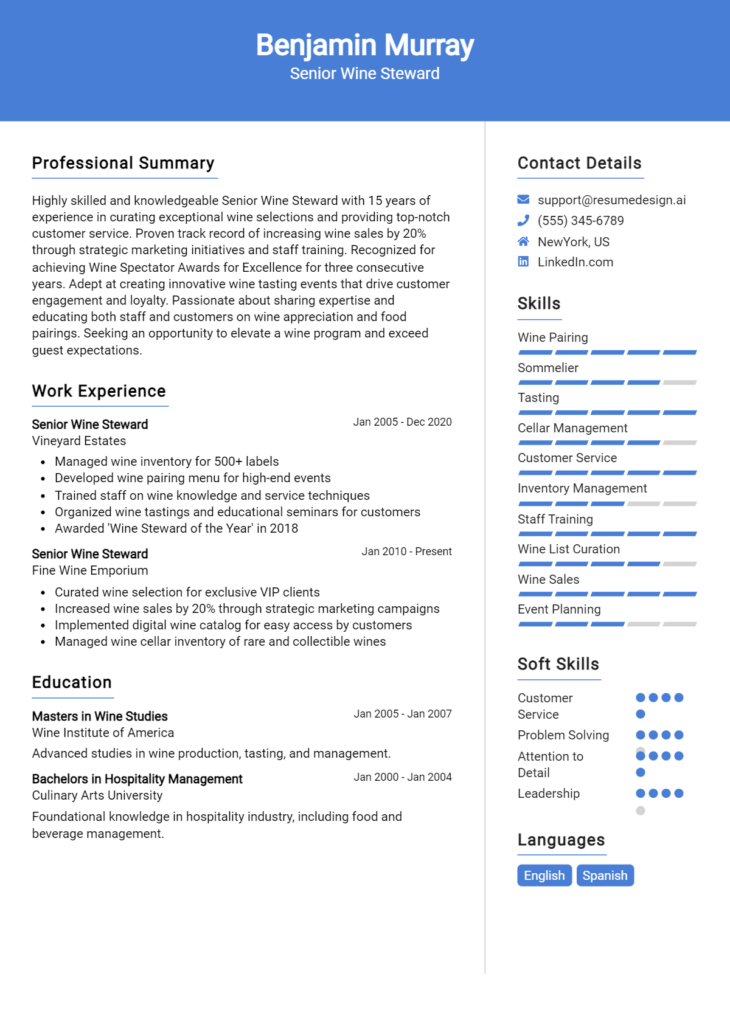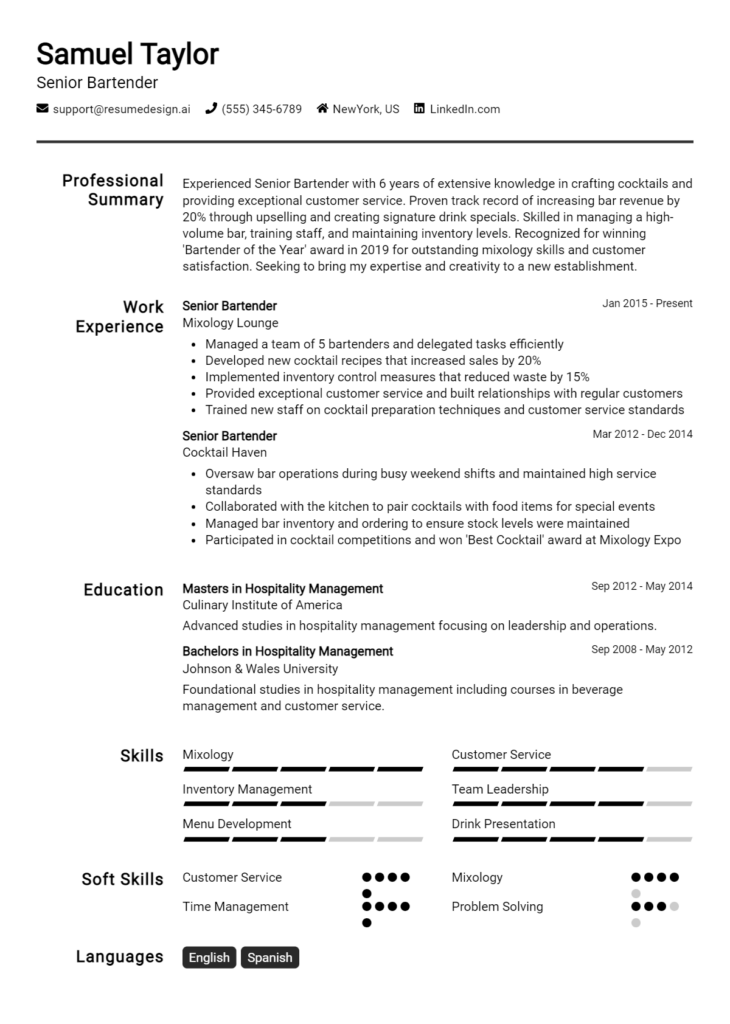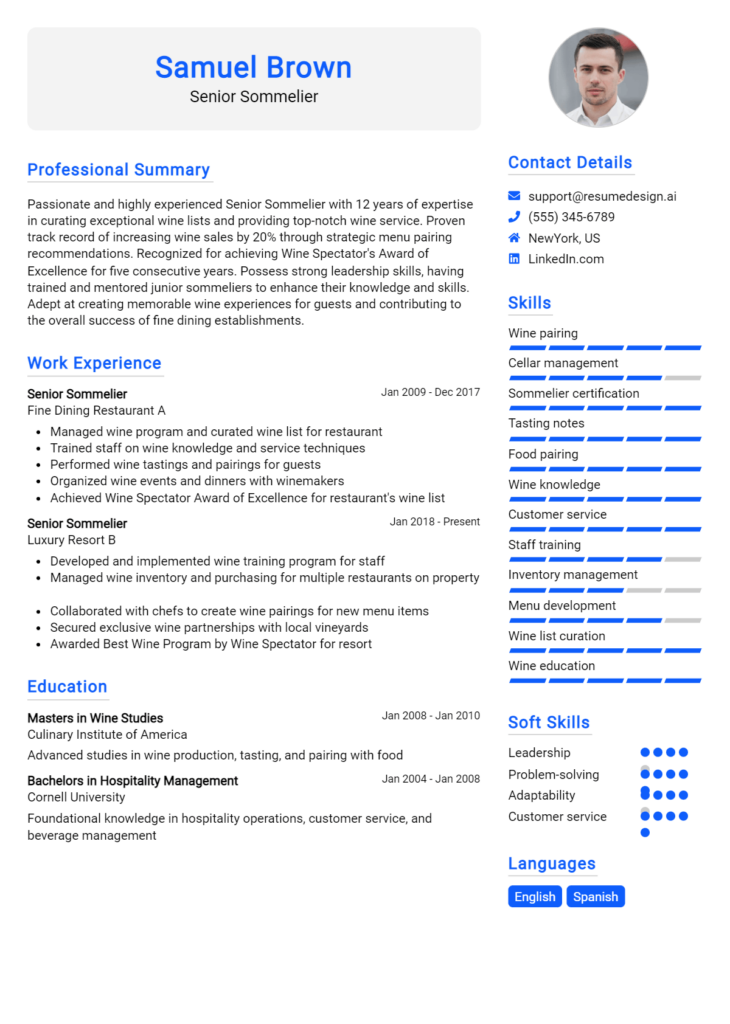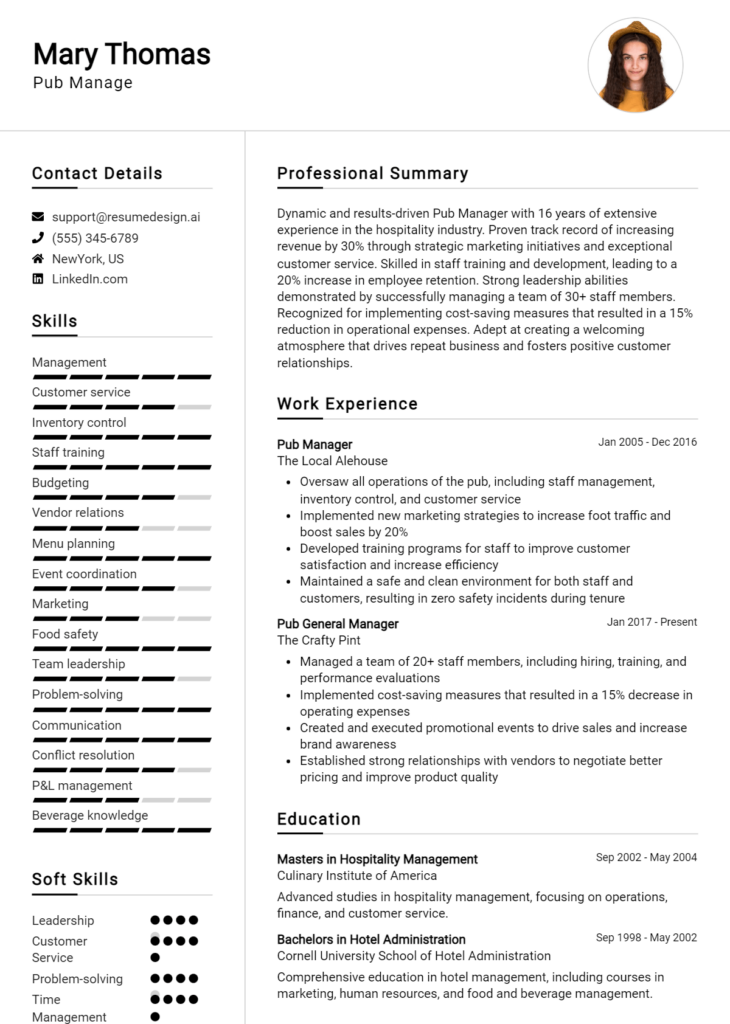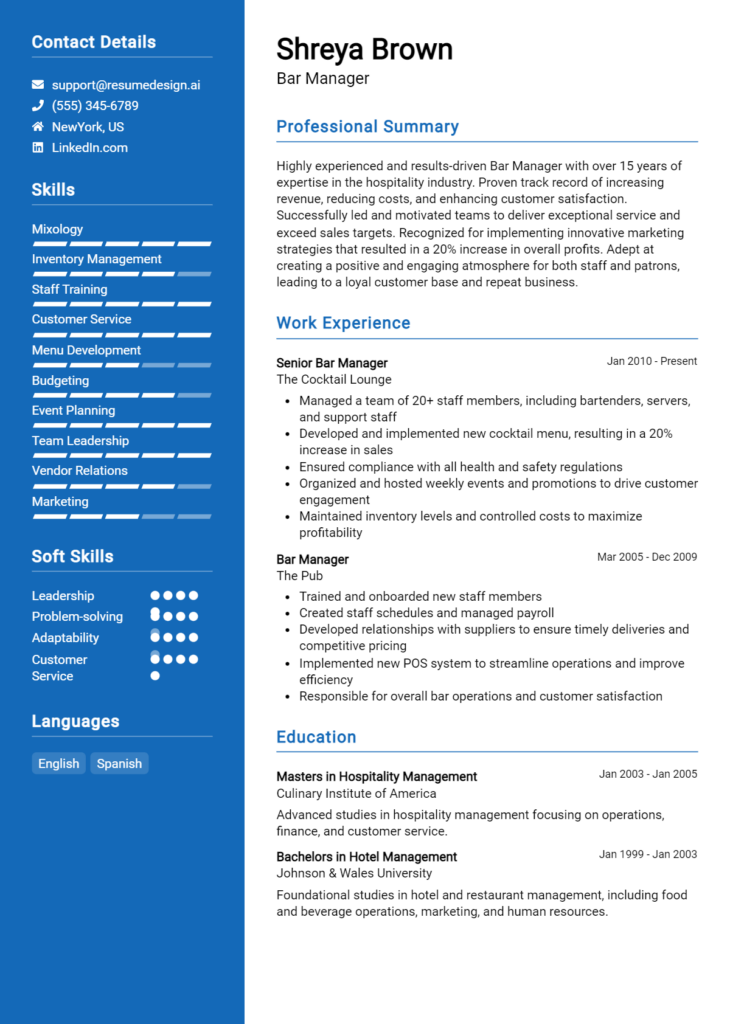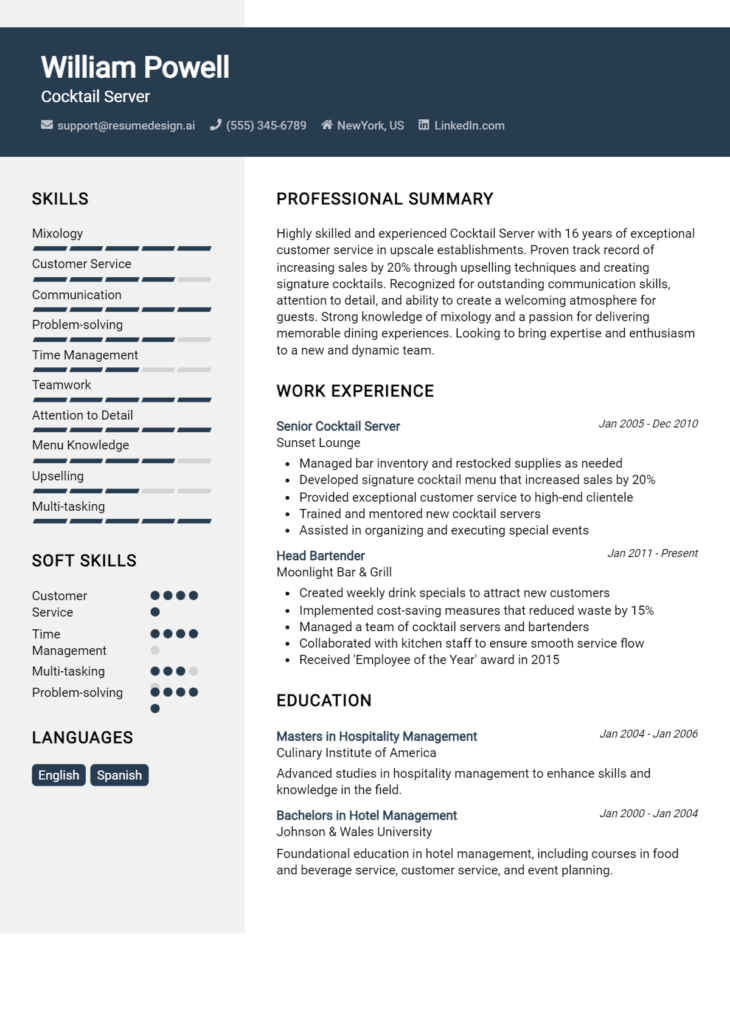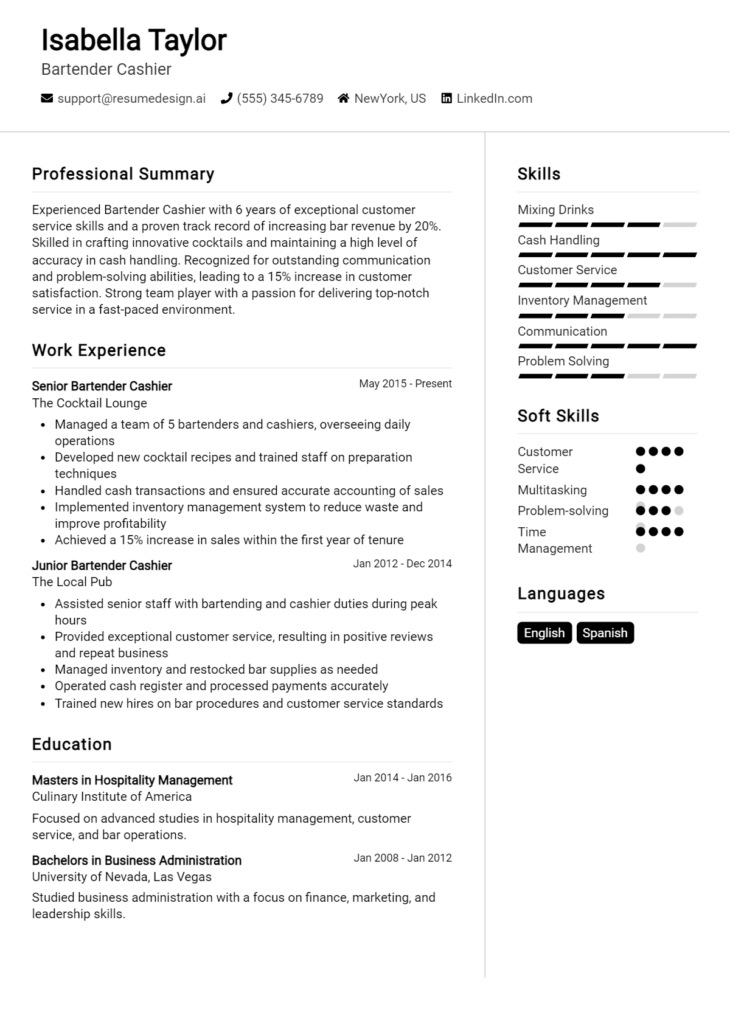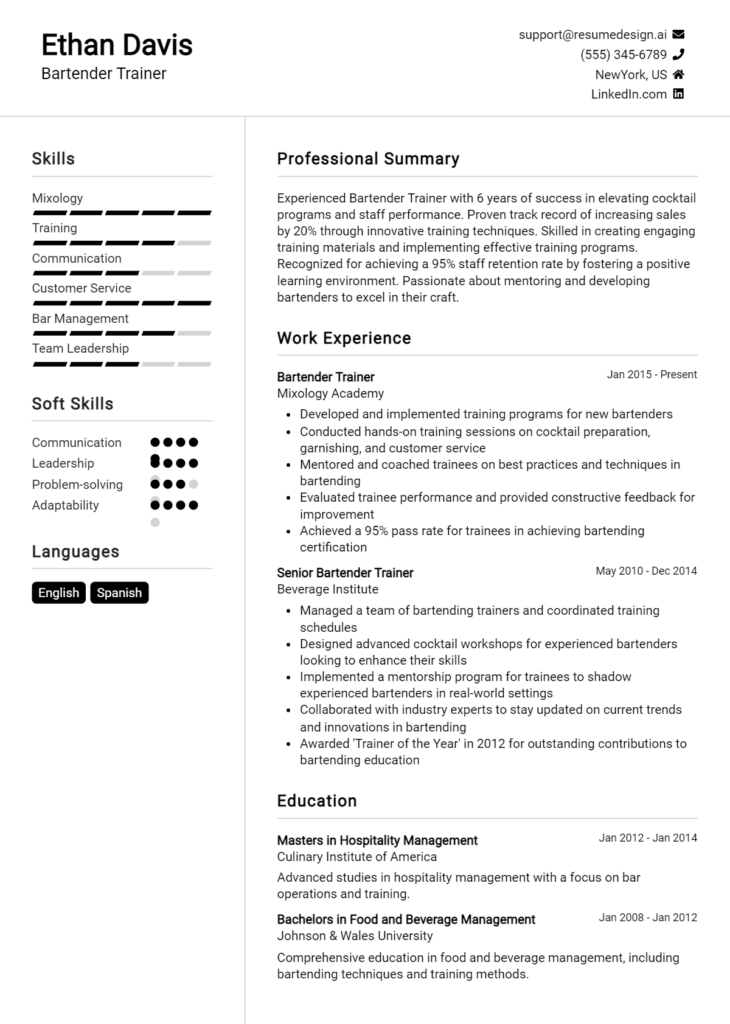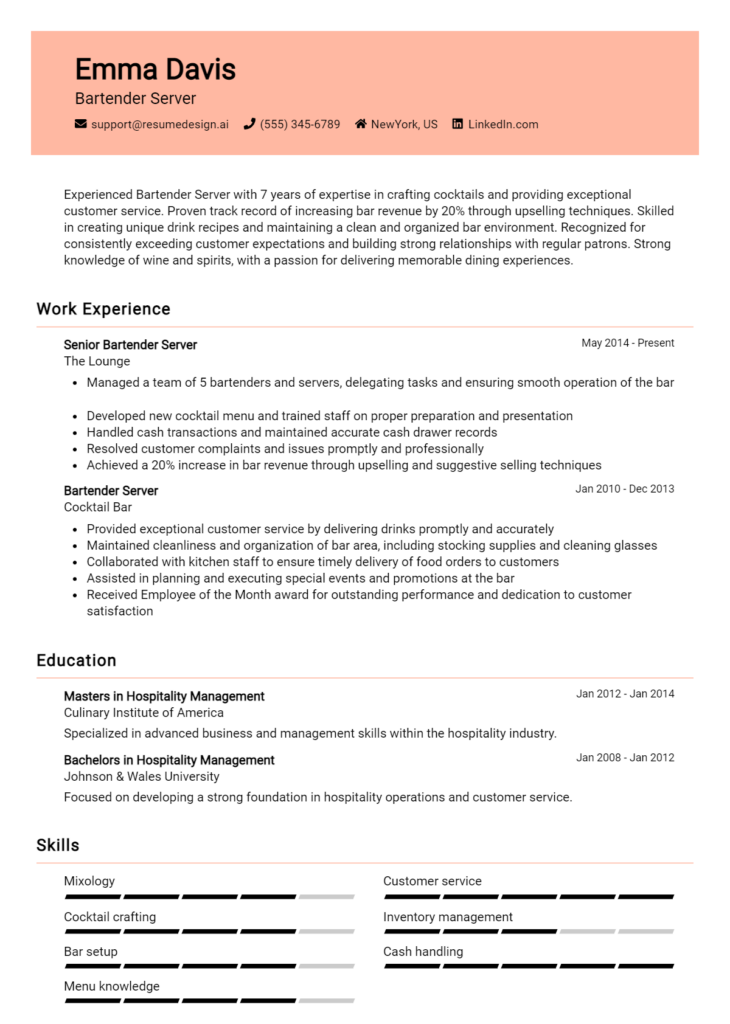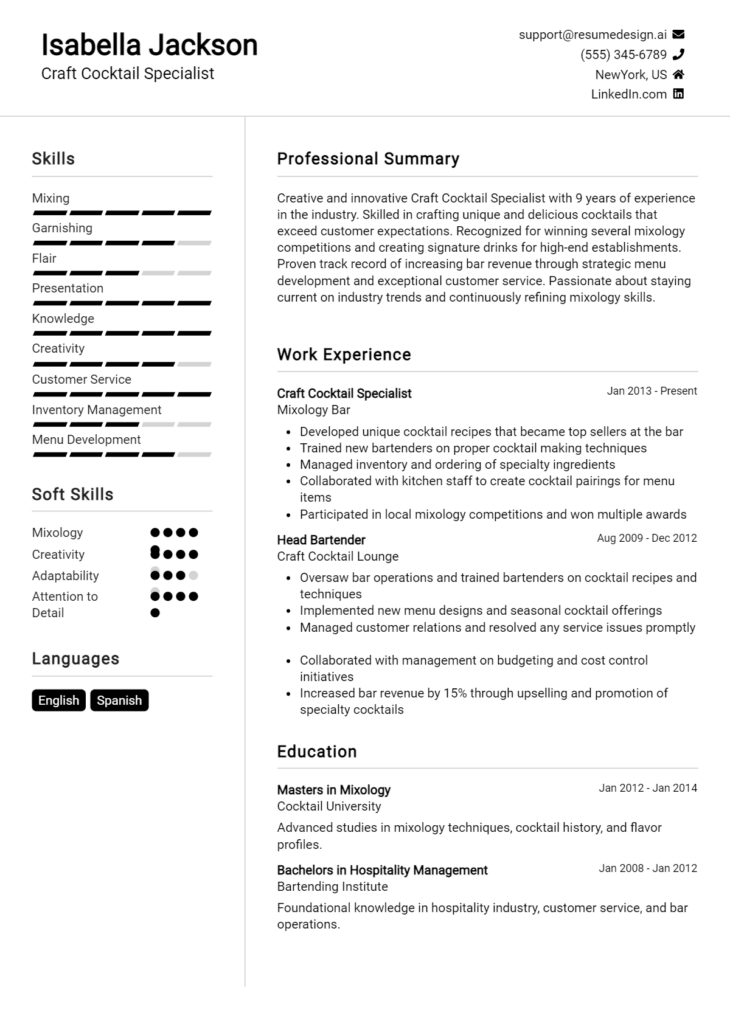Lead Bartender Core Responsibilities
The role of a Lead Bartender encompasses a variety of key responsibilities, including managing bar operations, training staff, and ensuring exceptional customer service. This position requires strong technical skills in mixology and an understanding of beverage trends, alongside operational expertise in inventory management and cost control. Excellent problem-solving abilities are essential for addressing customer concerns and maintaining bar efficiency. A well-crafted resume can effectively highlight these skills, showcasing how they contribute to the organization's overall success.
Common Responsibilities Listed on Lead Bartender Resume
- Oversee daily bar operations and staff management.
- Develop and implement innovative cocktail menus.
- Train and mentor bar staff on drink preparation and customer service.
- Manage inventory, including ordering and stock control.
- Ensure compliance with health and safety regulations.
- Handle customer inquiries and resolve complaints professionally.
- Monitor bar financials, including sales and expenses.
- Collaborate with kitchen and management teams for event planning.
- Maintain cleanliness and organization of the bar area.
- Stay updated on industry trends and new product offerings.
- Conduct regular staff meetings to promote communication and teamwork.
High-Level Resume Tips for Lead Bartender Professionals
In the competitive world of bartending, a well-crafted resume is crucial for standing out among a sea of candidates. For Lead Bartender professionals, your resume serves as your first impression, offering potential employers a glimpse into your skills, achievements, and experience. It is essential that this document not only showcases your bartending expertise but also reflects your ability to manage a team and create memorable customer experiences. This guide will provide practical and actionable resume tips specifically tailored for Lead Bartender professionals, ensuring that your application captures the attention of hiring managers.
Top Resume Tips for Lead Bartender Professionals
- Tailor your resume to the specific job description by incorporating relevant keywords and phrases.
- Highlight your bartending experience prominently, including the types of establishments you've worked in.
- Quantify your achievements, such as the number of customers served, revenue generated, or awards received.
- Showcase your leadership skills by detailing experiences where you trained or managed other staff members.
- Include certifications relevant to bartending, such as mixology courses or alcohol service training.
- Demonstrate your cocktail knowledge by mentioning any signature drinks you've created or innovative techniques you've implemented.
- Highlight your customer service skills, providing examples of how you've enhanced guest satisfaction.
- Keep the format clean and professional, using bullet points for easy reading and ensuring consistent fonts and styles.
- Include any relevant awards or recognitions that demonstrate your excellence in bartending.
- Proofread your resume to eliminate any errors or typos, as attention to detail is key in the bartending industry.
By implementing these tips, you can significantly increase your chances of landing a job in the Lead Bartender field. A tailored and well-organized resume not only highlights your qualifications but also conveys your professionalism and commitment to excellence in bartending, making you an attractive candidate for potential employers.
Why Resume Headlines & Titles are Important for Lead Bartender
In the competitive field of bartending, the role of a Lead Bartender is not just about mixing cocktails; it's about leading a team, creating unforgettable guest experiences, and driving the bar's success. A well-crafted resume headline or title is crucial for any applicant aspiring to this position. It serves as the first impression for hiring managers, providing an immediate snapshot of a candidate's qualifications and potential contributions. A strong headline can grab attention and summarize a candidate’s key strengths concisely, making it easier for employers to identify the right fit for their establishment. Therefore, a resume headline must be relevant, impactful, and tailored to the specific job being applied for.
Best Practices for Crafting Resume Headlines for Lead Bartender
- Make it concise: Aim for a headline that is brief yet descriptive, ideally no more than 10 words.
- Be role-specific: Clearly indicate that you are applying for the Lead Bartender position to avoid any ambiguity.
- Highlight key skills: Incorporate essential bartending skills or qualifications that set you apart.
- Use action-oriented language: Choose dynamic verbs that convey leadership and expertise.
- Include measurable achievements: If possible, reference quantifiable accomplishments to enhance credibility.
- Tailor to the job description: Customize your headline based on the specific requirements of the job posting.
- Showcase relevant certifications: Mention any certifications or training that are pertinent to the role.
- Keep it professional: Avoid overly casual language or jargon that may detract from your professionalism.
Example Resume Headlines for Lead Bartender
Strong Resume Headlines
Experienced Lead Bartender with 10+ Years in High-Volume Venues
Award-Winning Mixologist Specializing in Craft Cocktails
Dynamic Lead Bartender with Proven Leadership and Customer Service Skills
Certified Bartender and Beverage Director with Exceptional Event Planning Expertise
Weak Resume Headlines
Bartender Looking for Work
Experienced Worker in Food and Beverage
The strong headlines are effective because they clearly communicate the candidate's experience, skills, and areas of expertise relevant to the Lead Bartender role. They are specific and tailored, making it easy for hiring managers to see the value the candidate brings. In contrast, the weak headlines lack detail and specificity, failing to convey any unique qualifications or strengths that would capture the attention of potential employers. This makes them less memorable and impactful, diminishing the likelihood of advancing in the hiring process.
Writing an Exceptional Lead Bartender Resume Summary
Crafting an exceptional resume summary for a Lead Bartender is crucial in making a strong first impression on hiring managers. A well-written summary serves as a snapshot of your professional identity, quickly capturing attention by highlighting key skills, relevant experience, and notable accomplishments that align with the job role. It should be concise yet impactful, providing a compelling reason for the reader to delve further into your resume. Tailoring this summary to the specific job you're applying for demonstrates a genuine interest in the position and an understanding of the unique demands of the role.
Best Practices for Writing a Lead Bartender Resume Summary
- Quantify Achievements: Use numbers to highlight your successes, such as sales increases or customer satisfaction ratings.
- Focus on Relevant Skills: Emphasize skills that are essential for a Lead Bartender, such as mixology, customer service, and team leadership.
- Tailor to the Job Description: Customize your summary to reflect the specific requirements and preferences outlined in the job posting.
- Use Action Verbs: Start sentences with strong action verbs to convey confidence and proactivity.
- Highlight Unique Selling Points: Identify what sets you apart from other candidates, such as specialized training or awards.
- Keep it Concise: Aim for 3-5 sentences that effectively summarize your experience without overwhelming the reader.
- Showcase Soft Skills: Include interpersonal skills like communication and conflict resolution, which are vital in bartending roles.
- Proofread: Ensure your summary is free from grammatical errors or typos, as attention to detail is critical in the hospitality industry.
Example Lead Bartender Resume Summaries
Strong Resume Summaries
Dynamic Lead Bartender with over 7 years of experience in high-volume establishments. Increased cocktail sales by 30% through innovative menu design and staff training, while maintaining a 95% customer satisfaction rate.
Experienced Lead Bartender with a proven record of managing bar operations for busy nightclubs. Successfully reduced wait times by implementing efficient service protocols and trained a team of 10 bartenders to enhance customer engagement.
Creative Lead Bartender skilled in crafting signature cocktails and developing seasonal drink menus. Achieved recognition as 'Best Bartender' in the city, contributing to a 40% increase in bar revenue over one year.
Weak Resume Summaries
Bartender with experience looking for a new opportunity. I enjoy mixing drinks and providing customer service.
I have worked in bars for a few years and know how to make drinks. I am a good team player.
The strong resume summaries are considered effective because they provide specific details about achievements, quantify results, and highlight relevant skills that relate directly to the Lead Bartender role. In contrast, the weak summaries lack clarity, are too general, and fail to demonstrate the candidate’s impact or unique qualifications, making them less compelling to potential employers.
Work Experience Section for Lead Bartender Resume
The work experience section of a Lead Bartender resume is crucial as it serves as a platform to demonstrate the candidate's technical skills and leadership capabilities. This section allows potential employers to gauge the applicant's proficiency in crafting high-quality beverages, managing bar operations, and leading a team of bartenders to deliver exceptional customer service. By quantifying achievements—such as increased sales or improved customer satisfaction—and aligning past experiences with industry standards, candidates can effectively showcase their value in a competitive job market.
Best Practices for Lead Bartender Work Experience
- Highlight specific technical skills such as mixology, inventory management, and cocktail presentation.
- Quantify achievements with metrics, such as percentage increases in sales or customer satisfaction ratings.
- Emphasize experience in team management, including training and mentoring staff.
- Detail experience with high-volume service environments to demonstrate ability to work under pressure.
- Include any relevant certifications or training that contribute to your expertise.
- Align your experiences with industry trends and standards to demonstrate relevance.
- Use action verbs to convey a proactive and engaged work ethic.
- Focus on collaboration with kitchen staff and other departments to enhance the customer experience.
Example Work Experiences for Lead Bartender
Strong Experiences
- Increased cocktail sales by 30% within six months by introducing a seasonal menu and implementing upselling techniques.
- Successfully managed a team of 10 bartenders during peak hours, achieving a 95% customer satisfaction rating in guest surveys.
- Developed and executed a staff training program on mixology and customer service, resulting in a 20% reduction in employee turnover.
- Streamlined inventory processes, reducing waste by 15%, which contributed to an overall increase in profit margins for the bar.
Weak Experiences
- Worked at a bar and made drinks for customers.
- Helped with some inventory tasks and assisted other bartenders.
- Responsible for maintaining cleanliness in the bar area.
- Served drinks to customers during busy shifts.
The examples labeled as strong are considered effective because they provide clear metrics and showcase specific achievements that highlight the candidate's impact on both sales and team performance. In contrast, the weak experiences lack detail and quantifiable outcomes, failing to convey the candidate's actual contributions or skills, thus making them less impressive to potential employers.
Certifications and Education for a Lead Bartender Resume
When crafting a resume for a Lead Bartender position, it's essential to highlight both your certifications and educational background effectively. Here are some key points to consider when listing these qualifications:
Certifications:
Bartending Certification: Completing a recognized bartending school program demonstrates your foundational knowledge of drink preparation, bartending techniques, and customer service skills. This certification is often a priority for employers.
TIPS Certification: Training for Intervention Procedures (TIPS) is a widely recognized program focusing on responsible alcohol service. This certification is crucial for ensuring compliance with local laws and promoting safe drinking practices.
ServSafe Alcohol Certification: This certification covers important topics related to alcohol safety and responsible service. It is essential for bartenders to understand how to prevent over-serving and handle difficult situations.
Mixology Certification: A specialized mixology certification can set you apart, showcasing your advanced skills in crafting unique cocktails and understanding various spirits. This certification is particularly valuable in establishments that prioritize craft cocktails.
Educational Background:
High School Diploma or GED: A basic requirement for most bartending positions. It shows that you have completed your foundational education.
Associate Degree in Hospitality Management: This degree provides a comprehensive understanding of the hospitality industry, including food and beverage management, customer service, and event planning.
Culinary Arts Degree: A degree in culinary arts can be beneficial, especially if you work in a restaurant setting where food and beverage pairings are essential. It also demonstrates your knowledge of flavor profiles.
Bachelor’s Degree in Business Administration: While not specific to bartending, a degree in business can be advantageous for those looking to advance to management roles. It equips you with skills in management, finance, and marketing, all valuable in running a successful bar.
When listing your certifications and education on your resume, place them in a dedicated section, ensuring they are easy to find. Use bullet points for clarity and consider including the date of completion for each certification. Highlighting these qualifications will help you stand out as a knowledgeable and responsible Lead Bartender.
Top Skills & Keywords for Lead Bartender Resume
As a Lead Bartender, your resume is a vital tool that showcases your expertise and sets you apart in a competitive job market. Highlighting both your hard and soft skills is essential, as these attributes not only demonstrate your technical proficiency but also your ability to interact effectively with customers and manage a team. A well-crafted resume that emphasizes these skills will attract potential employers and highlight your qualifications for leading a bar or beverage service team. For a successful application, it's important to tailor your skills to match the specific demands of the position while also reflecting your unique strengths.
Top Hard & Soft Skills for Lead Bartender
Soft Skills
- Excellent communication
- Customer service orientation
- Team leadership
- Problem-solving
- Time management
- Attention to detail
- Adaptability
- Conflict resolution
- Multitasking ability
- Creativity in drink preparation
Hard Skills
- Extensive knowledge of cocktails and mixology
- Proficiency with bar equipment and tools
- Inventory management
- Cash handling and financial reporting
- Knowledge of state and local alcohol regulations
- Bartending software proficiency
- Basic food safety and sanitation practices
- Wine and beer knowledge
- Ability to create drink menus
- Experience with event planning and execution
By focusing on these essential skills, you can enhance your Lead Bartender resume, showcasing your capacity to excel in both the technical and interpersonal aspects of the role. In addition, showcasing relevant work experience will further solidify your qualifications and readiness to lead in a busy bar environment.
Stand Out with a Winning Lead Bartender Cover Letter
As a passionate and experienced bartender with over five years in high-energy bar environments, I am excited to apply for the Lead Bartender position at [Company Name]. My background in mixology, staff training, and customer service aligns perfectly with the requirements of this role. I am eager to bring my expertise in creating unique cocktails and enhancing guest experiences to your esteemed establishment.
Throughout my career, I have consistently demonstrated my ability to manage bar operations efficiently while maintaining a fun and engaging atmosphere. At [Previous Employer], I successfully led a team of bartenders, implemented new drink menus, and introduced a series of cocktail-making classes that not only improved staff skills but also increased customer satisfaction and repeat business. My strong communication skills and ability to build rapport with both guests and team members have been key to fostering a collaborative work environment that thrives on creativity and teamwork.
In addition to my bartending skills, I have a keen understanding of inventory management and cost control. I have effectively managed inventory levels to reduce waste and increase profitability, ensuring that the bar operates smoothly even during peak hours. I am certified in responsible alcohol service and prioritize creating a safe environment for both guests and staff. My commitment to excellence and attention to detail makes me a strong candidate for the Lead Bartender role at [Company Name].
I am excited about the opportunity to contribute my talents to your team and help elevate the bar experience at [Company Name]. Thank you for considering my application. I look forward to the possibility of discussing how my skills and experience align with your needs and how I can help your bar thrive.
Common Mistakes to Avoid in a Lead Bartender Resume
When crafting a resume for the position of Lead Bartender, it's essential to present a polished and professional document that accurately reflects your skills and experiences. However, many candidates make common mistakes that can hinder their chances of landing an interview. Understanding these pitfalls can help you create a more effective resume that stands out to potential employers. Here are some common mistakes to avoid:
Generic Objective Statements: Using a one-size-fits-all objective can make your resume feel impersonal. Tailor your objective to reflect your specific goals and how they align with the bar or restaurant's mission.
Lack of Relevant Experience: Failing to highlight your relevant bartending experience can lead to missed opportunities. Be sure to emphasize your previous roles, particularly any leadership positions or significant achievements.
Ignoring Keywords: Many employers use applicant tracking systems to filter resumes. Omitting industry-specific keywords related to bartending and hospitality can result in your resume being overlooked.
Poor Formatting: A cluttered or overly complicated format can distract from your qualifications. Ensure your resume is clean, organized, and easy to read, with consistent font sizes and styles.
Neglecting Soft Skills: While technical skills are vital for a Lead Bartender, soft skills like communication, teamwork, and problem-solving are equally important. Don’t forget to highlight these attributes in your resume.
Overloading with Irrelevant Information: Including unrelated work experience or excessive personal details can dilute your resume’s impact. Focus on relevant experience and skills that pertain specifically to bartending.
Omitting Certifications or Training: Certifications such as TIPS, ServSafe, or mixology courses are crucial in the bartending industry. Failing to mention these can make you seem less qualified than other candidates.
Typos and Grammatical Errors: Spelling and grammatical mistakes can create a negative impression and suggest a lack of attention to detail. Always proofread your resume or have someone else review it before submission.
Conclusion
In conclusion, the role of a Lead Bartender is multifaceted, requiring a blend of creativity, leadership, and exceptional customer service skills. As highlighted, a successful Lead Bartender not only crafts innovative cocktails but also manages inventory, trains staff, and ensures a welcoming atmosphere for patrons.
If you're looking to advance in this exciting field, it's crucial to present your experience and skills effectively. Review your Lead Bartender resume to ensure it reflects your expertise and accomplishments. To help you refine your application, consider utilizing the available resources such as resume templates and a resume builder that can streamline the process. Additionally, don’t forget to create a compelling first impression with a well-crafted cover letter template. Take the next step in your bartending career today!

